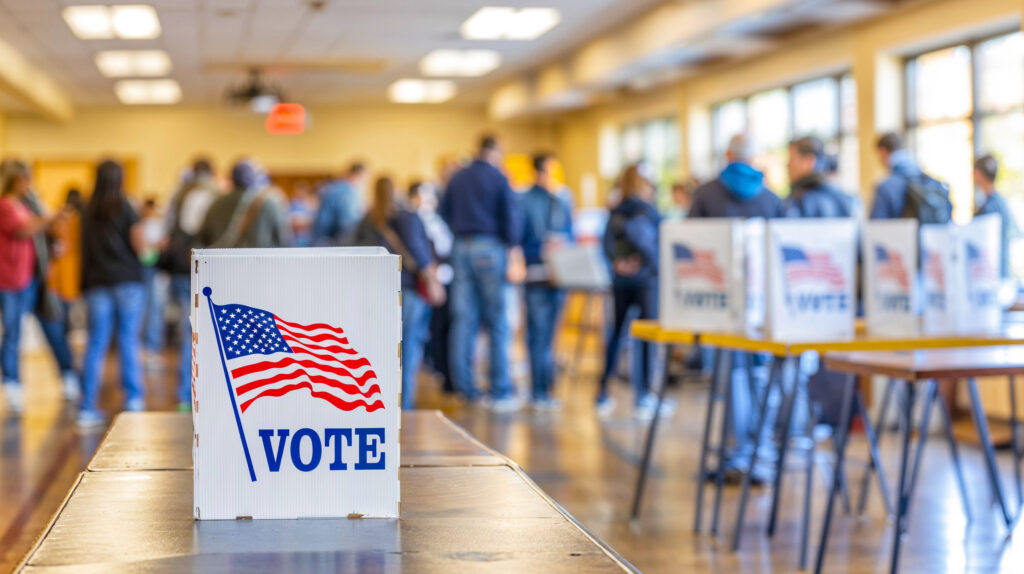The Stakes of Local Democracy
While national political dramas often capture headlines, the true architects of daily life are found much closer to home: in city councils and school boards. These local bodies make decisions that directly impact residents, from the quality of public services and infrastructure to property taxes and educational standards. For Wichita and Sedgwick County, the upcoming 2025 primary elections represent a critical juncture, directly influencing the trajectory of the community.
On Tuesday, August 5, 2025, Wichita residents will head to the polls for the primary election. This crucial step will narrow the field of candidates vying for key positions before the general election on November 4, 2025. The primary contests specifically target seats on the Wichita City Council (District 1) and the USD 259 Wichita School Board (Districts 1 and 5).
Beyond speeches and policy platforms, the financial backing of candidates plays a pivotal role in their ability to reach voters, build campaigns, and ultimately, secure victory. Understanding the “money trail”—who contributes, how much, and where those funds are spent—is essential for an informed electorate. This report delves into these financial landscapes, offering a detailed look at the funding dynamics shaping Wichita’s future.
Local elections frequently serve as direct reflections of a community’s priorities. The specific contests identified in the August 5th primary, such as those for the City Council and School Board, often highlight immediate concerns that resonate deeply with residents. For instance, the recent rejection of a significant school bond issue or ongoing discussions around housing and economic development in City Council District 1 underscore the tangible impact of these local races. Analyzing the financial underpinnings of these primary campaigns provides a revealing snapshot of the community’s immediate concerns and potential future policy directions.
The strategic significance of the primary is particularly pronounced in non-partisan races, such as those for the Wichita City Council. In the absence of established party machinery and traditional partisan voter turnout mechanisms, individual candidate campaigns must rely heavily on their own financial resources to achieve name recognition and engage directly with the electorate. The financial strength of a campaign in a non-partisan primary can therefore be a more direct indicator of a candidate’s perceived viability and organizational capacity, as they lack the built-in advantages that party affiliation might otherwise provide.
The Battle for Wichita City Council: District 1’s Financial Landscape
The Heart of Wichita’s Governance: A Singular Primary Focus
The Wichita City Council is instrumental in shaping urban policy, managing the city’s budget, and driving community development. In the 2025 primary cycle, only one of the three city council seats up for election will feature a primary contest: District 1. This singular focus makes the District 1 race a particularly intense and closely watched battle.
A Crowded Field for District 1
Five candidates are vying for the District 1 seat: Aujanae Bennett, Darryl Carrington, LaWanda DeShazer, Chris Pumpelly, and Joseph Shepard. This race is especially significant as the incumbent, Brandon Johnson, is term-limited, guaranteeing a new face will represent the district. The candidates recently participated in a forum at Wichita State University, offering voters an early glimpse into their platforms and personalities.
District 1’s Unique Political Fabric
District 1 holds a unique position within Wichita, often described as the city’s most liberal and progressive district. Historically, it has served as a crucial avenue for the Black community to elect its representatives. However, this election is distinct, as the local Democratic Party has not coalesced behind a single candidate, creating a more open and potentially unpredictable primary outcome. Key community concerns in the district include economic development, job opportunities, and addressing housing issues, including vacant properties and homelessness.
Campaign Finance Insights for District 1: The Search for Transparency
Candidates for First Class City offices, such as the Wichita City Council, are required to file campaign finance reports with both the Kansas Public Disclosure Commission (KPDC) and an additional copy with the City Clerk. These reports detail all receipts and expenditures, with contributions exceeding $50 needing to be itemized. The latest pre-primary reports were due on Monday, July 28, 2025, covering activity through July 24, 2025.
A critical aspect of these local races is the contribution limit: individuals and businesses are capped at donating $500 per candidate per election (primary and general are separate). While the available information clearly lists the candidates for Wichita City Council District 1 primary , specific fundraising totals for these candidates
before the primary are not explicitly provided in the available data. This stands in contrast to the detailed figures available for the school board races. This observation points to a potential challenge in readily accessing aggregated financial data for certain local contests, even though the underlying reports themselves are mandated to be filed. This suggests that while mechanisms for financial disclosure exist, the ease with which the public can access summarized, actionable financial data for these specific local races may be limited, potentially hindering broader voter awareness of the financial backing behind candidates.
Professor Neal Allen of Wichita State University notes the inherent difficulty in “raising money for a primary election in a district that is lower income”. Given the $500 individual contribution limit for city council races , candidates in District 1 may find it challenging to raise significant funds from a few large donors. This situation often necessitates a greater reliance on a larger number of smaller donations and robust grassroots organizing to fund their campaigns and reach voters. This dynamic suggests that success in this specific district might be less about high-dollar influence and more about broad community support and effective ground campaigns, potentially leading to an outcome that is more reflective of widespread voter sentiment rather than donor wealth.
For voters seeking this crucial financial information, reports are publicly accessible via the Sedgwick County Election Office’s “Election Documents and Reports” and the Kansas Secretary of State/Kansas Public Disclosure Commission websites. However, concerns have been raised that some groups might utilize strategies, such as having multiple individuals with the same address donate under their individual names, to potentially contribute more than the stated $500 limit. While this practice is not explicitly identified as a “controversy” in the provided information, it highlights a potential avenue for circumventing stated contribution limits. This, coupled with the general difficulty in tracking local political money and the observed absence of readily available aggregate data for City Council candidates, raises questions about the potential for less transparent, coordinated financial efforts to influence these non-partisan local elections. This does not imply wrongdoing but rather points to how the existing system could be navigated in ways that make it more challenging for the public to fully understand the true sources of campaign funding.
Table: Wichita City Council District 1 Primary Candidates (2025)
| Candidate Name | Office | Election Type | District | Phone Number |
| Aujanae Bennett | Wichita City Council Member | 2025 Primary | Wichita District 1 | 316-295-0581 |
| Darryl Carrington | Wichita City Council Member | 2025 Primary | Wichita District 1 | 316-880-1014 |
| LaWanda DeShazer | Wichita City Council Member | 2025 Primary | Wichita District 1 | |
| Chris Pumpelly | Wichita City Council Member | 2025 Primary | Wichita District 1 | |
| Joseph Shepard | Wichita City Council Member | 2025 Primary | Wichita District 1 |
Export to Sheets
Source: Sedgwick County Election Office, Current Candidates
Shaping Futures: Campaign Funds in the USD 259 School Board Primaries
The Cornerstone of Community: USD 259 School Board
The Wichita School Board (USD 259) plays a foundational role in the community, overseeing the largest school district in Kansas. Its members are responsible for approving curriculum, setting educational priorities, and managing a substantial budget of approximately $1 billion. Their decisions directly shape the educational landscape for thousands of students and families.
Primary Battles in Districts 1 and 5
The August 5th primary will feature contests for two key school board seats: USD 259 Districts 1 and 5. These races are particularly significant, as the outcomes will determine which candidates advance to the general election and potentially influence the future direction of the district.
District 1 Candidates & Fundraising Dynamics
In District 1, the primary features Diane Albert, Mackenzi Truelove, Sarah McMillen, and Kyle R. Wiseman. Diane Albert, the incumbent seeking her second term, has demonstrated significant fundraising prowess, reporting $7,840 as of July 24. Her major contributors include prominent local figures like architect Stan Shelden and bank executive Jeff Morris. Mackenzi Truelove has raised $1,195. Notably, Sarah McMillen and Kyle Wiseman have filed affidavits of exemption, indicating their intent to spend less than $1,000 on their campaigns.
District 5 Candidates & Fundraising Dynamics
For the District 5 race, the primary includes Kathy Bond, Michelle Cunningham, Amy Jensen, Phillip Samuels, and Caleb Smith. Retired teacher Amy Jensen has raised nearly $5,000, surpassing incumbent Kathy Bond, who reported $3,800 heading into the primary. Jensen’s donors largely consist of local teachers and retired teachers, while Bond’s largest single contributor was Republican District Judge Eric Yost. Michelle Cunningham, Phillip Samuels, and Caleb Smith have also filed affidavits of exemption, indicating they plan to spend less than $1,000 on their campaigns.
Broader Implications of School Board Funding
The financial activity in these school board races takes on added significance in the context of recent community issues, such as the narrow rejection of a $450 million school bond issue earlier in 2025. The campaign funds raised by candidates, and the sources of those funds, can often reflect differing stances on such significant financial decisions and the broader vision for the school district’s future. The contributions from individuals like Jon Rolph (owner of Thrive Restaurant Group and former Kansas Board of Regents president) and Kristine Rogers (wife of former Wichita school board member and Kansas Lt. Gov. Lynn Rogers) to Amy Warren, who is running for District 6 in the general election, suggest a network of influence from business and political circles. Similarly, the shared donors between District 1 incumbent Diane Albert and District 6 incumbent Hazel Stabler, including architect Stan Shelden and bank executive Jeff Morris, indicate a degree of alignment among certain business interests in supporting incumbents or candidates perceived to maintain a particular direction for the school board. In contrast, Amy Jensen’s donor base, largely composed of local and retired teachers, suggests a campaign rooted in the educational community itself, potentially signaling a different set of priorities for the board.
The practice of candidates filing an “Affidavit of Exemption” when they do not intend to spend more than $1,000 on their campaigns, as seen with several candidates in both USD 259 Districts 1 and 5 , presents a transparency challenge. While legally permissible, this means that the financial activities of a significant portion of candidates remain undisclosed to the public. For voters, this lack of detailed financial reporting for candidates operating under the exemption can make it difficult to fully assess the financial landscape and the various interests at play in these local races, potentially limiting the completeness of the public’s understanding of campaign funding.
Sedgwick County Commission: A Primary Election Absence
Role of the County Commission
The Sedgwick County Commission serves as the governing body for Sedgwick County, overseeing county operations, budget allocation, and policy decisions that affect a broad range of public services, including public safety, health, and infrastructure.
No Primary Contests in 2025
A notable finding from the available information is the absence of primary elections for Sedgwick County Commission seats in 2025. While the user query specifically mentioned upcoming elections for these seats, the Sedgwick County Election Office’s calendar and candidate lists for the 2025 primary do not indicate any contests for County Commissioner. This means that any candidates for the County Commission in 2025 would likely advance directly to the general election in November, or that the current commissioners are not facing a primary challenge in this cycle.
Implications for the Election Cycle
The lack of a primary contest for the Sedgwick County Commission simplifies the election process for these particular offices. It suggests that either there were fewer than three candidates who filed for any given district, thus negating the need for a primary, or that the terms of the current commissioners (such as Pete Meitzner for District 1, Jeff Blubaugh for District 2, Stephanie Wise for District 3, Ryan Baty for District 4, and Jim Howell for District 5) are not expiring in a way that necessitates a primary challenge in 2025. For voters, this means that the selection process for these county-level positions will occur solely during the general election in November.
Campaign Finance for County Races
While no primary contests are identified for the Sedgwick County Commission in 2025, it is important to understand the campaign finance regulations that would apply to such races. Candidates for county offices, similar to those for First Class City offices and USD 259 School Board, are subject to the oversight of the Kansas Public Disclosure Commission (KPDC). Individual contributions to county candidates are limited to $500 per election cycle (primary and general are considered separate elections). These candidates are required to file detailed receipts and expenditures reports, with contributions over $50 needing to be itemized and the occupation of contributors providing more than $150 also disclosed.
Navigating the Money Trail: Accessing Campaign Finance Information
Public Disclosure as a Cornerstone
Public disclosure of campaign finance information is a cornerstone of transparent governance, enabling citizens to understand who is funding political campaigns and potentially influencing elected officials. In Kansas, a multi-layered system facilitates this transparency, though navigating it requires diligence.
Kansas Public Disclosure Commission (KPDC)
The primary state-level authority for campaign finance oversight is the Kansas Public Disclosure Commission (KPDC). Formerly known as the Kansas Governmental Ethics Commission, its name was officially changed as of July 1, 2025, reflecting ongoing legislative adjustments to the regulatory landscape. The KPDC is charged with administering, interpreting, and enforcing the Campaign Finance Act (K.S.A. 25-4142 et seq.). This includes overseeing campaign finance for state, county, and first-class city offices, as well as unified school districts with more than 35,000 pupils, such as USD 259.
The KPDC provides several resources for accessing campaign finance data:
- Online Search Tools: The Kansas Secretary of State’s website, in conjunction with the KPDC, offers contributor search functions and quick statistics for state-level candidates. While these are primarily for state offices, they are part of the broader system.
- Publications and Handbooks: The KPDC offers various publications, including handbooks for candidates, treasurers, and political action committees, which detail reporting requirements and best practices.
- Report Due Dates: Specific schedules for filing receipts and expenditures reports are published. For the 2025 election cycle, reports for First Class City Candidates and Wichita School Board candidates were due on January 10, 2025 (covering 2024 activity), July 28, 2025 (covering January 1 to July 24, 2025), and October 27, 2025 (covering July 25 to October 23, 2025), with a final report due January 10, 2026.
- Contribution Limits: Detailed charts outlining legal limits for contributions to various offices are available.
- Disclosure Requirements: Reports must itemize contributions exceeding $50, and the occupation of a contributor must be reported for any contribution over $150. Cash contributions are limited to $100, and anonymous contributions are restricted to $10 or less. In-kind contributions also have specific reporting requirements.
Sedgwick County Election Office
For local elections within Sedgwick County, the Sedgwick County Election Office serves as a crucial repository for campaign finance documents. This office maintains “Election Documents and Reports” which allow public viewing of campaign expense reports and election canvass information. While the City of Wichita and USD 259 offices file with the KPDC, the Sedgwick County Election Office is the local point of contact and also handles reports for other city and school offices within the county not covered by the KPDC.
Challenges in Accessing Data
Despite the existence of these public reporting mechanisms, a notable challenge lies in the accessibility of aggregated financial data for specific local races. As observed with the Wichita City Council District 1 primary, while individual candidate reports are filed, readily available summarized totals for all candidates in a given race are not always immediately presented in the public domain. This often necessitates a manual review of individual reports, which can be a time-consuming process for the average citizen seeking to understand the full financial picture of a local election.
The complexity of the regulatory landscape, involving multiple filing authorities such as the Kansas Public Disclosure Commission, the Sedgwick County Election Office, and the City Clerk for Wichita, creates a fragmented system. This fragmentation, coupled with differing reporting requirements based on the office, can make it challenging for the average citizen to track campaign finance comprehensively across all local races. This complexity potentially diminishes the practical impact of disclosure laws, as the effort required to gather and synthesize information can be a barrier to informed public engagement. The ongoing evolution of campaign finance oversight, exemplified by the renaming of the Kansas Governmental Ethics Commission to the Kansas Public Disclosure Commission , further indicates a dynamic regulatory environment. This suggests that rules and oversight mechanisms are subject to change, requiring continuous public vigilance to stay informed about current campaign finance practices and how they affect transparency.
The Regulatory Framework: Laws, Limits, and Enforcement
Kansas Campaign Finance Act (K.S.A. 25-4142 et seq.)
The core legislation governing campaign finance in Kansas is the Campaign Finance Act, codified under K.S.A. 25-4142 et seq. This act sets the rules for campaign financing at the state, county, and first-class city levels, including unified school districts with over 35,000 pupils. The Kansas Public Disclosure Commission (KPDC) is responsible for administering, interpreting, and enforcing these statutes.
Key Provisions
The Act outlines several key provisions to ensure transparency and regulate financial contributions:
- Contribution Limits: For local offices, including county and first-class city positions (like the Wichita City Council), and the State School Board, the maximum contribution from any single source is $500 per election cycle. It is crucial to note that primary and general elections are considered separate cycles, meaning a donor can contribute up to $500 for the primary and another $500 for the general election to the same candidate. There is no limitation on the amount a candidate and/or their spouse can loan or donate to their own campaign.
- Disclosure Requirements: Any contribution exceeding $50 must be itemized in campaign finance reports, detailing the donor’s name and address. For contributions over $150, the occupation of the contributor (or their spouse) must also be reported. Cash contributions are limited to a maximum of $100 from any single contributor. Anonymous contributions are generally prohibited if they exceed $10, with any such excess required to be disposed of in a non-political manner, such as a donation to charity. In-kind contributions, such as donated services or materials, are also subject to reporting requirements and count towards contribution limits.
- Affidavit of Exemption: Candidates for city and school offices (except USD 259, City of Wichita, and City of Derby, which file with KPDC) who do not intend to spend or receive more than $1,000 on their campaigns may file a notarized Affidavit of Exemption. This exempts them from submitting regular campaign finance reports.
Enforcement Mechanisms and Penalties
The KPDC employs various mechanisms to ensure compliance with campaign finance laws. These include:
- Civil Penalties: The commission can assess civil fines for violations of the Campaign Finance Act. A first violation can incur a fine of up to $5,000, while a second violation can lead to a fine of up to $10,000. In cases where the respondent derived pecuniary gain from the violation, the fine can be set at up to double the amount of the gain.
- Penalties for Late Filing: The Legislature has increased civil penalties for late filing of certain reports. After a 48-hour grace period, a penalty of $100 is assessed, with an additional $50 per day for each day the report remains outstanding, up to a maximum of $1,000.
- Criminal Penalties: Failure to file a campaign finance report or fraudulent campaign finance reporting are classified as misdemeanors. Making excessive campaign contributions is also a misdemeanor.
- Ineligibility for Office: An individual who has failed to pay any assessed civil penalty or fine, or failed to file required reports, is ineligible to become a candidate for state or local office until the penalty or fine is paid or waived. The commission also has the authority to issue cease and desist orders, seek injunctions, and enter into consent decrees to ensure compliance.
The regulatory framework reflects a dual nature in its approach to transparency. While the laws are designed to establish the public’s right to information about financial affairs in campaigns , provisions like the Affidavit of Exemption and the sheer volume and fragmented nature of the data can inadvertently obscure the full financial picture for voters. This creates a tension between the legislative intent of transparency and the practical reality of public access to comprehensive information. Furthermore, the robust penalties for violations, including civil fines and criminal charges , underscore the state’s commitment to upholding campaign finance integrity. However, the documented instances of legal challenges and the associated attorney fees suggest that enforcement is a complex and resource-intensive undertaking, which could potentially influence the vigor with which certain violations are pursued.
The Pulse of Local Politics and the Power of the Purse
The upcoming August 5, 2025, primary elections in Wichita for City Council District 1 and USD 259 School Board Districts 1 and 5 represent critical junctures for the community. These local contests, often overshadowed by state and national races, directly shape the quality of public services, educational standards, and economic development within Wichita and Sedgwick County. The financial dynamics of these campaigns—who contributes, how much, and how funds are spent—are integral to understanding the forces at play and the potential influences on future policy decisions.
Analysis of the campaign finance landscape reveals both strengths and areas for improvement in transparency. For the USD 259 School Board races, detailed fundraising figures provide a clear picture of financial backing, highlighting the support networks and strategic alignments of candidates. The observation that certain donor groups align with specific candidates, or that some candidates rely more on grassroots support, offers valuable insight into the diverse interests vying for influence in the educational sphere. However, the prevalence of “Affidavits of Exemption” for candidates spending less than $1,000 means a portion of the financial activity in these races remains outside detailed public scrutiny, posing a challenge to complete transparency.
In the Wichita City Council District 1 primary, while the candidates are clearly identified, the readily available aggregated financial data is less explicit in the public domain. This suggests that while reporting requirements exist, the ease of access to summarized financial information for the public could be enhanced. This situation, coupled with the observation that some financial strategies might involve multiple individual donations from the same address to maximize contributions, underscores the ongoing need for vigilance in tracking campaign funding. The non-partisan nature of these city council races further amplifies the importance of individual campaign funding, as candidates cannot rely on party infrastructure to the same extent.
A crucial finding is the absence of primary elections for Sedgwick County Commission seats in 2025, contrary to common assumptions. This means the selection process for these county-level positions will occur solely during the general election, simplifying the primary ballot for county residents.
The Kansas Public Disclosure Commission, recently renamed from the Kansas Governmental Ethics Commission, serves as the central authority for campaign finance oversight. Its comprehensive framework of laws, including contribution limits, detailed disclosure requirements, and a range of civil and criminal penalties for violations, aims to ensure accountability. However, the multi-layered system of filing authorities and the inherent complexity of campaign finance data can make it challenging for the average citizen to fully grasp the intricate web of political contributions.
Ultimately, the power of the purse in local elections is undeniable. While financial resources are crucial for campaign visibility and voter outreach, the true measure of a vibrant democracy lies in an informed and engaged electorate. Understanding the money trail, its regulations, and its implications empowers citizens to make more educated decisions at the ballot box, ensuring that local governance truly reflects the will and priorities of the community. Continued efforts to enhance the accessibility and clarity of campaign finance data will be vital in fostering a more transparent and responsive local political landscape in Wichita and Sedgwick County.




